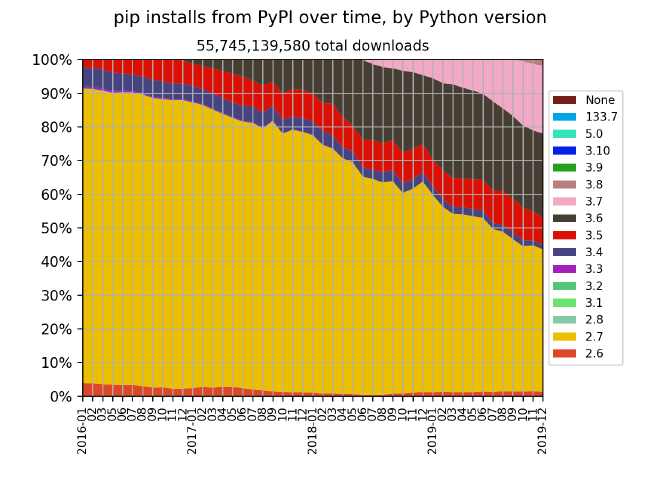Python version share over time, 6
Table of Contents
January 2016 — December 2019 #
To celebrate the end of life of Python 2 on 1st January 2020, here’s some statistics showing how much different Python versions have been used over four years.
Here’s the pip installs for all packages from the Python Package Index (PyPI), between January 2016 and December 2019:

pip #
The package installer

six #
Python 2 and 3 compatibility library

NumPy #
Scientific computing library

pytest #
Testing framework

pandas #
Data analysis toolkit

Coverage.py #
Code coverage testing

Pillow #
Imaging library

Django #
Web framework

Matplotlib #
2D plotting library

Flake8 #
Linter

Pylint #
Linter

TensorFlow #
Machine learning library

pylast #
Interface to Last.fm

How #
Statistics were collected using pypi-trends.py, a wrapper around pypinfo and pypistats to fetch all monthly downloads from the PyPI database on Google BigQuery and save them as JSON files. Data was downloaded over several days as getting all months uses up a lot of free BigQuery quota. Then jsons2csv.py plots a chart using matplotlib. Raw JSON data is in the repo.
See also #
- Data Driven Decisions Using PyPI Download Statistics
- Python version share over time, 1 (January 2016 — June 2018)
- Python version share over time, 2 (January 2016 — October 2018)
- Python version share over time, 3 (January 2016 — December 2018)
- Python version share over time, 4 (January 2016 — March 2019)
- Python version share over time, 5 (January 2016 — October 2019)
- PyPI Stats: See package download data for the past 180 days, without needing to sign up for BigQuery
- pypistats: A command-line tool to access data from PyPI Stats